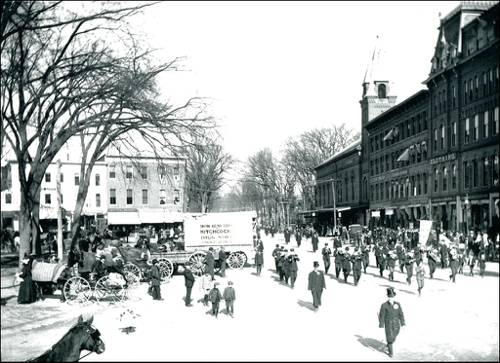
FAQ About The Impact of Marching Bands on Community Identity

What role do marching bands play in building community identity?
Marching bands significantly contribute to community identity by providing a sense of unity and shared experiences through music and performances. They often participate in local events, parades, and school functions, which help foster community spirit and pride. These bands become a symbol of the community's cultural heritage and traditions, bringing people together regardless of their backgrounds.

How do marching bands influence local culture?
Marching bands influence local culture by preserving musical traditions and introducing new ones. They often blend different musical styles, incorporating elements of local flavor into their performances. The band's presence at cultural events, holidays, and festivals can enhance the celebration of local customs and traditions, making them an integral part of a community’s cultural fabric.

What impact do marching bands have on community spirit?
Marching bands heighten community spirit by serving as a rallying point for local pride and enthusiasm. Their performances evoke a sense of belonging and hometown pride, energizing crowds during events and creating lasting memories for community members. This collective enjoyment and enthusiasm contribute to a stronger, more spirited community identity.

Can marching bands positively affect youth development in a community?
Yes, marching bands can positively influence youth development by providing young individuals with valuable life skills and experiences. Participation in a marching band fosters teamwork, discipline, responsibility, and creativity. It also offers young people a sense of accomplishment and belonging, which is particularly beneficial during their formative years.

Are there any economic benefits associated with marching bands in a community?
Marching bands can have indirect economic benefits for a community. They often attract crowds to local events, increasing foot traffic and potentially boosting sales for local businesses. Additionally, events featuring marching bands, such as parades and competitions, can draw visitors from other areas, contributing to local tourism and economic activity.

How do marching bands contribute to educational outcomes in schools?
Marching bands enrich educational outcomes by integrating musical education with physical activity, promoting students' academic and social development. They provide students with an opportunity to develop musical skills, foster discipline and teamwork, and enhance their physical fitness. Participation in band activities is often linked to improved concentration and academic performance.

What historical significance do marching bands hold in communities?
Marching bands have a storied history in many communities, often linked to historical events and local traditions. They serve as living witnesses to a community's past, preserving cultural heritage through music and ritualistic performances that have been passed down through generations. Their presence often symbolizes continuity and respect for local history.

How do marching bands engage with diverse community groups?
Marching bands engage with diverse community groups by being inclusive and open to participants from various backgrounds. They often perform at events that celebrate cultural diversity and bring different segments of the community together. By doing so, they act as bridges that foster camaraderie and understanding among different cultural or social groups within the community.

What challenges do marching bands face in maintaining their role in community identity?
Marching bands can face several challenges, such as funding constraints, declining membership, and balancing traditional expectations with modern innovations. Maintaining high-quality performances requires resources and dedication from both participants and the community. Additionally, they must continuously engage the community to keep their performances relevant and impactful.

How can communities support their local marching bands?
Communities can support their local marching bands by attending their performances, providing financial support through donations or sponsorships, and volunteering for organizational tasks. Encouraging young people to join and participate, as well as advocating for music programs in schools, can also help sustain the vitality and presence of marching bands in the community.

Do marching bands have any influence on local traditions and festivals?
Yes, marching bands often play a vital role in local traditions and festivals by providing musical accompaniment that enhances the festive atmosphere. Their performances can be an integral part of the event, contributing to the overall cultural narrative and invigorating traditional celebrations with music and rhythm.

What role do marching bands play in local sports events?
In local sports events, marching bands serve as entertainers and morale boosters. Their engaging performances and enthusiastic music create an energetic atmosphere, rallying supporters and cheering on teams. They are a key feature of the game day experience, providing entertainment during breaks and encouraging crowd participation.

Are there any social benefits for individuals participating in marching bands?
Individuals who participate in marching bands benefit socially by developing strong bonds and friendships with fellow members. The collaborative nature of rehearsals and performances fosters a sense of teamwork and belonging. Participants often improve their communication skills and gain confidence, both vital attributes that extend beyond the band environment.

How do marching bands maintain their relevance in modern communities?
Marching bands maintain their relevance by adapting to modern musical trends and incorporating contemporary pieces and styles into their repertoire. Engaging with the community, actively participating in popular events, and leveraging social media to showcase their work help them connect with wider audiences, ensuring they remain a relevant cultural force.

Can marching bands serve as a platform for community outreach?
Yes, marching bands can be an effective platform for community outreach by participating in charitable events and collaborating with local organizations on socially beneficial projects. Their visibility and public appeal make them suitable ambassadors for various causes, helping to raise awareness and support through their performances and presence.

What are some famous community events that feature marching bands?
Famous community events that feature marching bands include the Macy's Thanksgiving Day Parade in the United States, the Tournament of Roses Parade in Pasadena, and the Notting Hill Carnival in London. These events highlight the vibrancy and skill of marching bands, showcasing them as central to the celebration's entertainment.

How can marching bands evolve to meet changing community identities?
To meet evolving community identities, marching bands can incorporate diverse musical styles, include members from varied backgrounds, and ensure their performances reflect contemporary themes and narratives relevant to the community. Embracing change while respecting tradition allows bands to remain reflective of the communities they represent.

Why are marching bands important for cultural preservation?
Marching bands are crucial for cultural preservation because they carry forward musical traditions and community stories through their performances. By preserving traditional melodies and incorporating cultural dances or symbols into their routines, they serve as cultural custodians, ensuring that local heritage is honored and remembered.

What types of music are commonly performed by marching bands?
Marching bands perform a wide variety of music, including traditional marches, classical adaptations, popular music, patriotic songs, and sometimes jazz or contemporary pieces. The diversity in their repertoire allows them to appeal to a broad audience and cater to different events, reinforcing their role in enhancing community identity through music.
